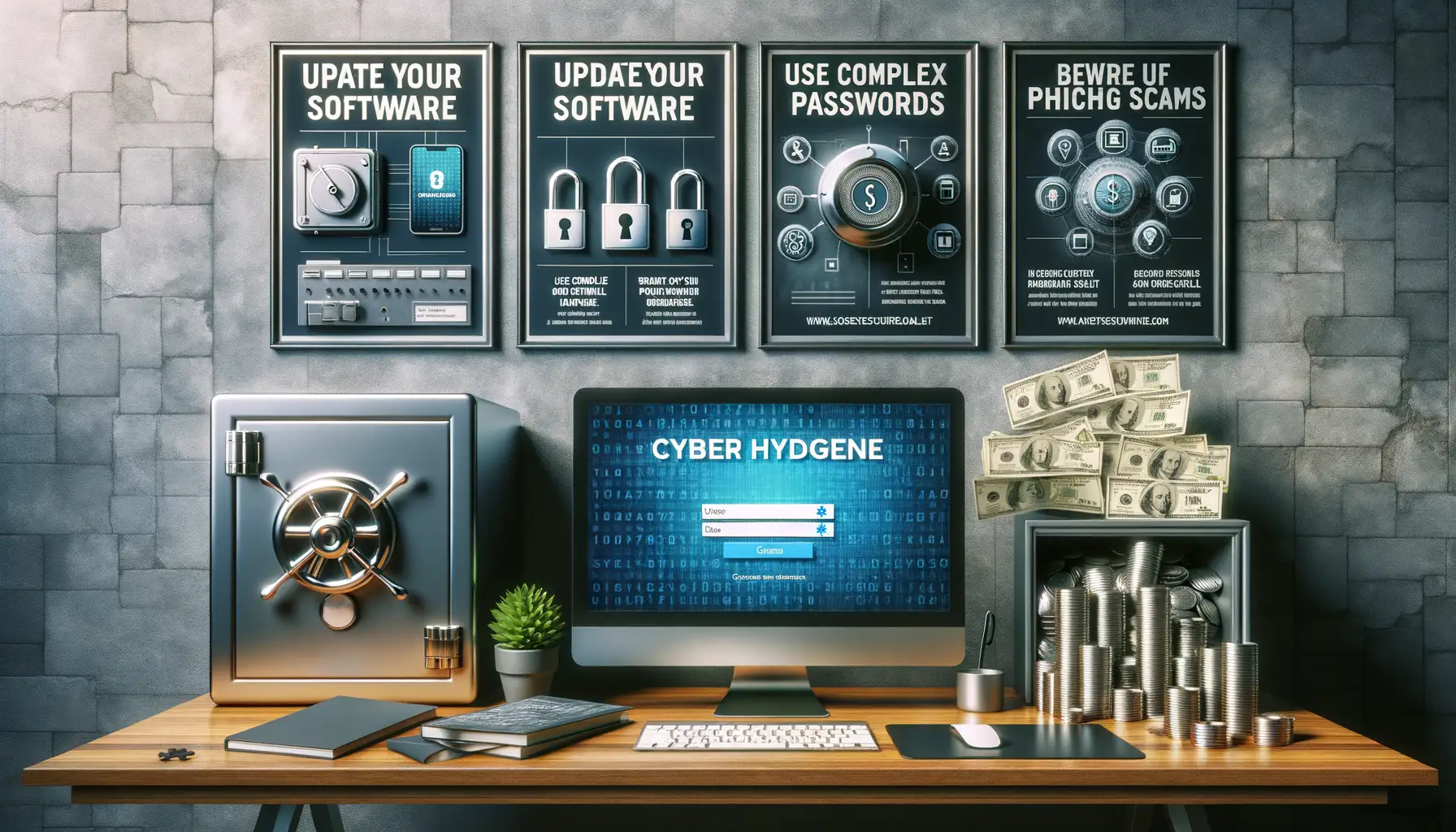Understanding the Importance of Cyber Hygiene
The Foundations of a Secure Digital Life
Imagine your online presence as a house. Would you leave the front door wide open? Absolutely not. Yet, without practicing proper cyber hygiene, that’s precisely what many of us unknowingly do. Cyber hygiene is your digital cleaning routine—your way of locking doors and shutting windows to keep malicious actors out while protecting everything precious inside, like your financial data.
Why does it matter so much? Because in today’s hyper-connected world, one careless click can lead to disaster. A weak password or neglected device update could be all it takes for hackers to swoop in and wreak havoc. Think of it as washing your hands to ward off germs; you can’t see cyber threats, but they’re everywhere, waiting for a chance to strike.
Every little step counts, and together, they add up to a rock-solid defense system, giving you peace of mind and keeping your hard-earned money safe from digital predators.
Common Threats to Financial Data Security

Hidden Dangers Lurking in the Digital Shadows
Picture this: your financial data is like a treasure chest, bursting with sensitive information that hackers would love to plunder. But how do they break the lock? Often, it’s through phishing attacks. These sneaky emails or fake websites trick you into handing over bank details or login credentials, often disguised as something innocent—like a note from your bank or even a shipping notification.
Another common culprit? Weak or reused passwords. Think of them as the rusty padlocks of the digital world—easily picked. And let’s not forget about malware, which worms its way into your devices through suspicious downloads or bogus apps, silently siphoning off your data.
- Social engineering scams: Manipulative tactics that prey on fears or emotions to extract precious information.
- Unsecured public Wi-Fi: It looks convenient but acts like a trapdoor, exposing your online activity to prying eyes.
- Outdated software: Old systems are riddled with vulnerabilities, making them a hacker’s dream.
Your Trusted Apps Could Be Betraying You
Sometimes, the threats come from where you least expect them—your favorite apps or even third-party platforms. If these aren’t secured properly or experience a breach, your saved payment details could spill out like water from a leaky bucket. Even Android or iOS app permissions can quietly exploit your trust, accessing far more personal data than they need. It’s unsettling, right? That’s why staying alert and proactive feels less like an option and more like a superpower in today’s digital landscape.
Essential Cyber Hygiene Practices for Financial Safety

Fortify Yourself With Smart Digital Habits
Picture your financial data as a treasure chest. Now imagine it sitting in the middle of a crowded square with nothing but a flimsy padlock on it. Scary, isn’t it? That’s what poor cyber hygiene feels like in the digital world. To truly protect your wealth, you need to create layers of defense that even the craftiest cyber pirates would think twice about touching. Let’s dive into the essentials that’ll transform your “padlock” into an impenetrable fortress.
- Never reuse passwords. If one password is stolen, it’s like giving thieves a golden key to all your accounts. Unique, strong, and randomly generated passwords are your best bet.
- Keep software up to date. Those updates you snooze on? They’re often patching vulnerabilities hackers are itching to exploit.
- Enable multi-factor authentication (MFA). Think of it as a secret handshake no one can fake—only you get full access.
Watch Out For Digital Wolves in Sheep’s Clothing
Hackers don’t always break in—they trick you into opening the door. Be wary of phishing scams disguised as urgent messages from your bank or enticing investment offers sent via email. Hover over links before clicking, and verify sources if something feels even remotely off. Remember, even wolves wear suits.
And don’t forget: public Wi-Fi might feel convenient, but it’s a villain in disguise. Without a VPN encrypting your connection, your private details hang out in plain sight, ready for prying eyes. Is saving a little mobile data really worth risking your savings?
Advanced Measures to Enhance Digital Protection

Fortify Your Digital Fortress
Think of your financial data like a treasure chest—it’s precious, and to protect it, you need more than just a basic lock. Advanced tools and strategies are your reinforced steel barriers. Let’s break this down, step by step.
First, embrace the power of multi-factor authentication (MFA). Passwords alone? They’re like hiding your front door key under the welcome mat. But MFA? It’s the two-step confirmation that ensures even if someone gets your password, they’re met with “Not so fast!” Think fingerprint scans, mobile app codes, or even security keys—it’s like adding layers of armor to your digital presence.
Here’s another game-changer: use data encryption software. This is where your sensitive info gets scrambled into unreadable code—a digital cloak of invisibility. Only authorized parties can unlock it. Perfect for protecting files stored in cloud drives or USB devices.
- Invest in a reputable Virtual Private Network (VPN) for secure online browsing.
- Consider anti-phishing browser extensions—they spot scams before you even click.
- Regularly update firmware on all your devices. Yes, even the “smart” refrigerator!
These tools may seem complex, but they’re far easier than untangling financial chaos after an attack. Make these measures your new norm—they’ll have your back when it matters most.
Be Proactive, Stay Ahead of Hackers
Hackers are clever, but you can be smarter. Start by keeping tabs on your own personal vulnerabilities. Have you done a security audit lately? Think of it as a spring cleaning for your accounts—delete old apps crawling with permission requests, close unnecessary online profiles, and strengthen those weak passwords we all regret making in a hurry.
Also, dive into the world of behavior-based monitoring systems. Imagine a guardian watching over your accounts 24/7, analyzing unusual patterns like sudden logins from foreign countries or suspicious transactions. Banks often offer this service, but standalone cybersecurity software can too.
Lastly, don’t underestimate the value of training. Cyber threats evolve constantly, so why shouldn’t you? Take courses or attend webinars about phishing techniques and dark web scams—it’s like giving yourself an extra shield against attacks.
This isn’t just about staying safe; it’s about staying one step ahead, always.
Conclusion and Final Tips for Staying Secure

Small Adjustments, Big Rewards: Final Steps for Cyber Security
If you’ve made it this far, congratulations—you’re already way ahead in safeguarding your financial data. But let’s not leave any door unlocked. Think of these final tips as the bolts on your digital vault.
- Revisit your passwords regularly: Are they strong enough to survive modern hacking techniques? Use a mix of upper and lowercase letters, numbers, and symbols. And no, “Password123” doesn’t count!
- Enable multi-factor authentication (MFA): Think of MFA as the bouncer outside your online accounts—without the full VIP credentials, hackers won’t have a chance.
Stay Vigilant in the Digital Wild West
Online threats evolve constantly, much like weeds overtaking a garden unless tended to. Keep your security software up to date—it’s your personal knight in shining armor, repelling malware and phishing attempts before they even reach you. Limit sharing financial details online to only *absolutely necessary* situations.
And here’s a game-changer: remember, not every “urgent bank email” is legit. A quick pause could save your savings from scam artists lurking behind fake logos and scare tactics.

